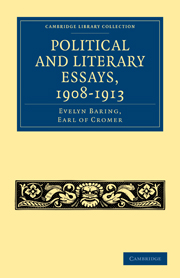V - THE INTERNATIONAL ASPECTS OF FREE TRADE
Published online by Cambridge University Press: 07 September 2011
Summary
PAPER READ AT THE INTERNATIONAL FREE TRADE CONGRESS AT ANTWERP, August 9–21, 1910
I have been asked to state my opinion on the effect of Free Trade upon the political relations between States. The subject is a very wide one. I am fully aware that the brief remarks which I am about to make fail to do justice to it.
A taunt very frequently levelled at modern Free Traders is that the anticipations of their predecessors in respect to the influence which Free Trade would be likely to exercise on international relations have not been realised. A single extract from Mr. Cobden's writings will suffice to show the nature of those anticipations. In 1842, he described Free Trade “as the best human means for securing universal and permanent peace.”
Inasmuch as numerous wars have occurred since this opinion was expressed, it is often held that events have falsified Mr. Cobden's prediction.
In dealing with this argument, I have, in the first place, to remark that modern Free Traders are under no sort of obligation to be “Cobdenite” to the extent of adopting or defending the whole of the teaching of the so-called Manchester School. It may readily be admitted that the programme of that school is, in many respects, inadequate to deal with modern problems.
In the second place, I wish to point out that Mr. Cobden and his associates, whilst rightly holding that trade was to some extent the natural foe to war, appear to me to have pushed the consequences to be derived from that argument much too far.
- Type
- Chapter
- Information
- Political and Literary Essays, 1908–1913 , pp. 127 - 140Publisher: Cambridge University PressPrint publication year: 2010First published in: 1913



